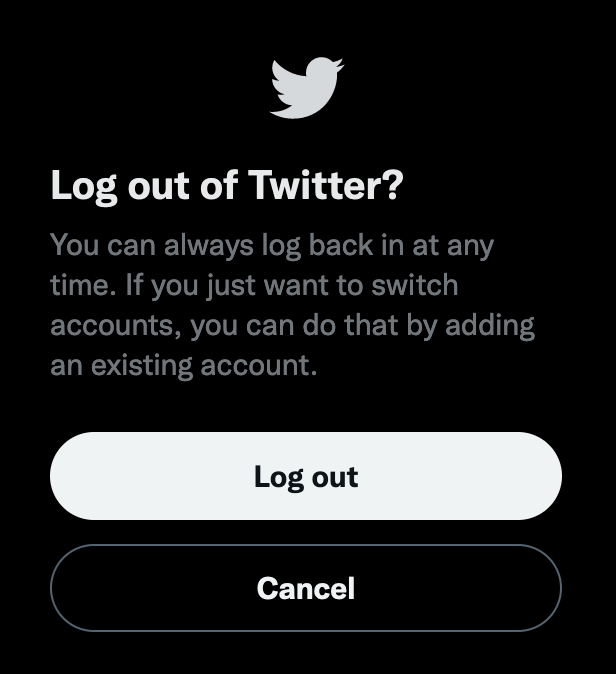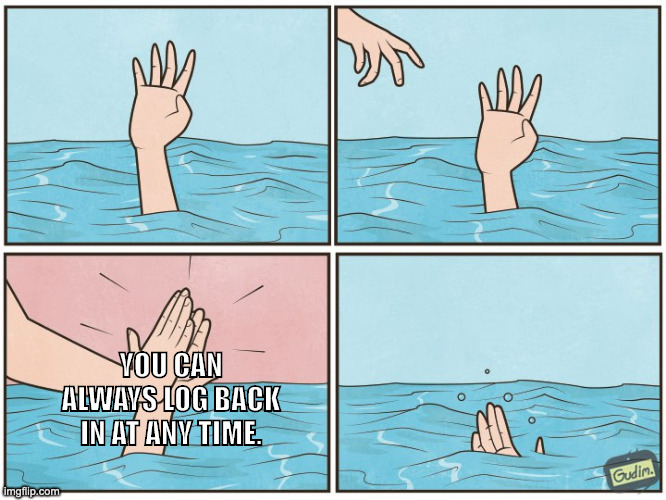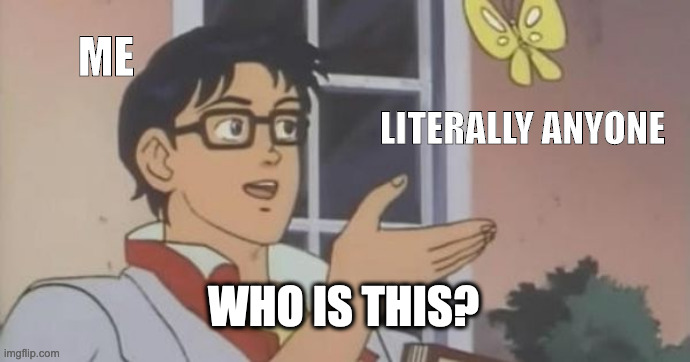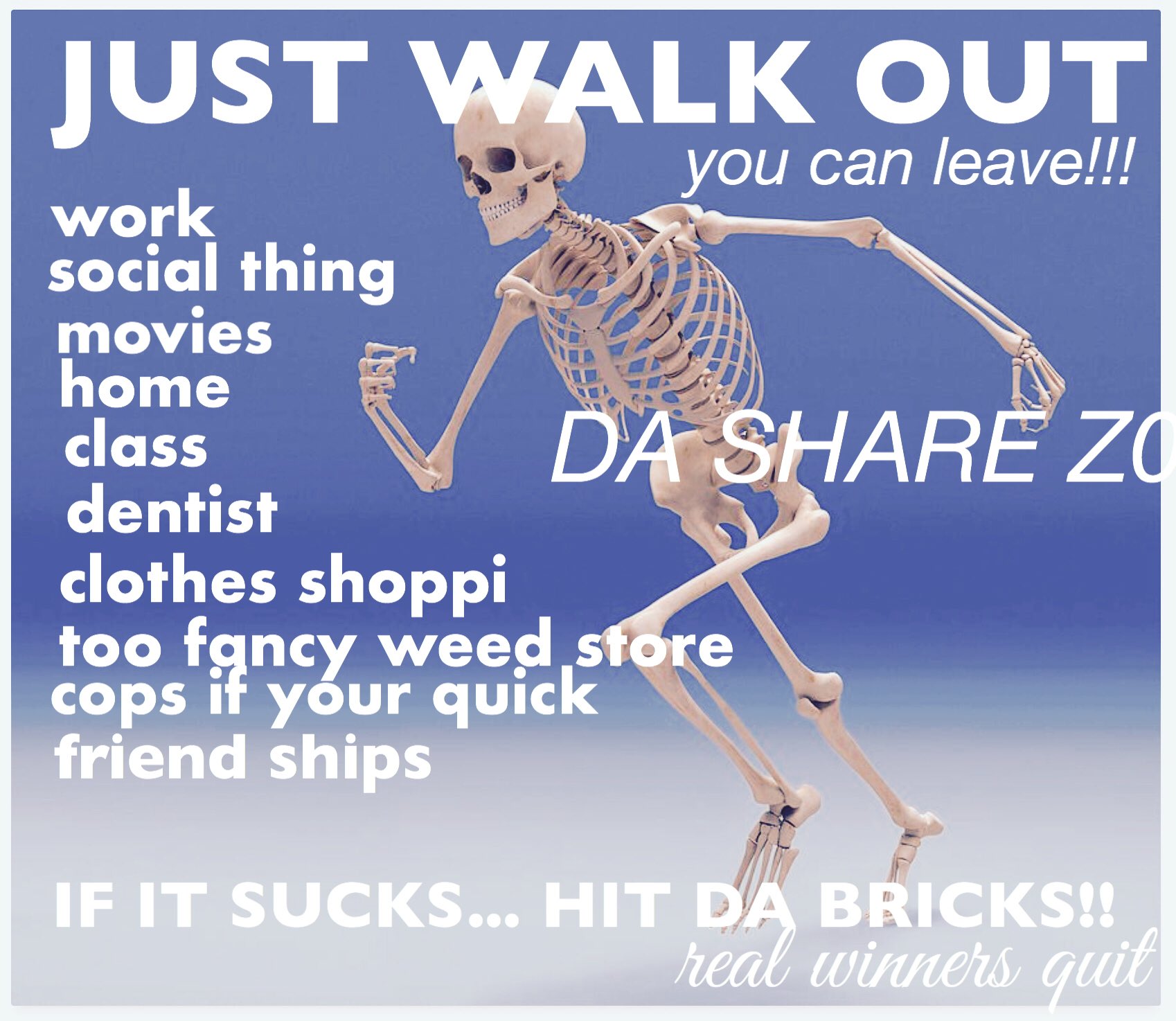Farewell, Hellsite!
Disclaimer: obviously this is my personal experience and it's not gonna apply to everyone out there! Peace <3
✩
So today I actually logged out of twitter—clicked "log out" instead of just closing it like I usually do—and I felt such a genuine spark of joy when my timeline faded away that I don’t know if I should log back in for a while, if ever.

I'm not doing a digital detox, I don’t believe in that for me. I use digital tools and media every day, and they bring accessibility and excitement to my life! This is something about twitter specifically. Something about digital social platforms that makes me feel sick to my stomach when I use them, that slowly but surely floods me with the poisons I most loathe in myself: jealousy, resentment, violent insecurity. I log in to see what my friends are up to, hoping maybe I can connect with them or let them know I’ve been thinking of them, but as I browse I start to feel a knife in my heart whenever I scroll past their posts and I think (irrationally), why didn’t they say that to me? Are they avoiding me? And when I can’t bear to scroll anymore, when I consider posting a little update of my own before I leave—or even a big update, an update like my nearing marriage—I start down a spiral of thoughts like, who actually cares, though and when nobody interacts with this, it will break my heart. And to avoid getting my heart broken, I erase what I’ve written, discard the draft, put down my phone or close my laptop and try to crawl my way out of my brand new depression hole, feeling like Sisyphus.

I don’t know what my damage is, but this is my relationship with social media nowadays. It has been for several years, and it doesn’t show signs of changing, so I’m giving up. I'm transitioning away from the big social media platforms.
✩
For a year and change I’ve been experimenting with my internet engagement: cutting out certain websites entirely, restricting the content I consume and curating what I'm shown in my feeds, setting boundaries for when to check up on someone and when to take a step back. I basically abandoned tumblr and twitter, my main haunts, and stuck to Reddit, where I joined only subs related to hobbies and positive interests of mine. The idea was just to rework the balance of uplifting versus worrying content I viewed for a while, but I discovered some interesting things along the way.
One: Being a ghost online is nice sometimes. Being fully dead is not the same, but it has its merits.
What I mean by this is that sometimes it's nice to lurk online with zero plans to interact with anyone, no expectations for engagement from others. I'm sure plenty of people do this, but for me it's a new habit. It feels like I'm a ghost, haunting my profile without making direct contact with the living.
Turns out, I love doing this. I've always liked 'haunting' irl social situations, so it makes sense I could enjoy doing it online. I am at my strongest and most confident when I can lay low around others, gathering information and taking my time formulating my thoughts and feelings. It takes me longer than other people (see point seven: I'm way more autistic than I realized) so I need all the time I can get.

Being "fully dead" takes it a big step further. It means not even looking at anyone's posts online and pretending the internet doesn't exist, like I've "moved on." It's how I think of it when I take long breaks from social media altogether. Functionally, it gives me the time and space needed to remember who I am. I am the kind of person that is easily swallowed up by the personalities around me and it's hard not to become a mere extension of the most prominent people in my life. I struggle a lot with my sense of identity and self-esteem, so taking time away to be the only human online—forcing me to rediscover my sense of self—is sort of a necessity. Especially if I want to avoid inadvertently parasitizing my friends and acquaintances with my insecurities and fears.
Two: I don’t know if I’m capable of maintaining a healthy friendship online.
Being bad at online friendship is a strange and worrying concept to me, as someone who has spent much of my life convinced that I socialize better online than in person. Maybe I used to be. I've been online for most of my life. I met my first internet strangers in virtual pet forums and chat rooms, then developed close friendships on deviantArt, my first long-term social site.
Those friendships may have been too close, even. My most significant relationship throughout high school was with one person on dA with whom I spoke constantly. They monopolized not only my time but my opinions and emotions. We both had good intentions, but it was unfortunately a toxic friendship for both of us, and when it ended it was with an immense amount of pain on my side of things. They had become a large part of my identity—they were my best friend for half a decade. We had been pen pals for years and visited each other's homes (chaperoned, of course). I had strong feelings for them. When we broke apart, it was like ripping out one of my organs by hand.
That's far from the extent of my bad experiences with keeping friends, and there's no way I can summarize my friendship baggage here without my social media habits becoming little more than a footnote instead of the primary subject. The point is that I've developed a nasty pair of shadows that loom over me and my relationships to this day: a massive fear of abandonment, and a heavy paranoia that everyone I care about is constantly forgetting about me. These insecurities follow me into every new friendship and cloud every interaction with new acquaintances, whether I like it or not.
I'm trying to overcome it. My main defense so far is to look for signs that a loved one does care about me of their own volition, but I can be difficult to convince.
With people I'm fortunate enough to see in person, this is a little easier. Online, where there is only text, and the text mostly only comes in a direct conversation—which I usually must prompt myself, thus skewing the results (according to Bad Brain)—helpful evidence is far harder for me to produce. I convince myself that I'm pressuring and coercing people into sticking around, and it messes with my head real bad. The internet can make these thought patterns so much harder to ignore.
Three: Twitter makes me ill, the end! Tumblr and other websites are not as bad, but they still worsen my condition if I'm not careful.
Y'all probably know it already, but twitter is a bad fuckin' website. It's funny because there is a lot of great content and valuable conversation there, but still it's just rotted to its core with something awful that I can't put my finger on. It's not necessarily the bigots or the assholes or the aggressive monetization or the awful clusterfuck of algorithms. It's just bad and there is a direct correlation between the amount of time I spend on it and the amount of mentally ill (obstructive, destructive) that I feel. And the effect is immediate!!

This is probably one of the first things I noticed after peacing out. After getting away from twitter for at least a couple weeks, any time I went back, there was an instant, obvious negative effect on my health. Later on, after a month or two of totally abandoning it, I realized I was significantly more functional in my daily life.
Like: calmer, more motivated, more receptive to mood-improving things, more resilient against my usual stressors... Things like that. Things like I'm not kept awake for three hours at night, cycling through panic thoughts and putting myself down until I wish I could just shove my brain through a meat grinder to shut it up.
Whatever the actual reason, twitter is cursed, objectively.
Four: Guilt and committing to do better are not enough to ward off the negative effects of me being Online.
One of the single toughest barriers to me starting this experiment in the first place, and the biggest hurdle in sticking with it, was the guilt of abandoning what was also essentially my news feed. (Side note: I resent that my news, activism information, and casual social updates all come from the same behemoth content feeds.)
I wouldn't call myself an activist, but I do have strong values. It's important to me to be educated, keep informed, and give help to people and causes however I'm able. This kept me on twitter and tumblr long, long after I would otherwise have left (or purged my follow list), because they are still great places to hear from diverse groups of people and share opportunities to help those in need. I want to keep up, but there needs to be an alternate way. Currently, news and discourse are intermixed with art, jokes, and private updates with no rhyme or reason; during extreme world events, the emotional whiplash has a strong impact on my mental state, making me panicked and confused. Misinformation and unimportant issues are rampant on the timeline as well, and while I value being able to read critically and fact check, doing so all day, every day is exhausting.
Unfortunately, I'm aware that I'm lucky to even be able to get away from serious issues by ignoring the internet for a while and shoving myself under a rock. Most people don't have that luxury. I'm still searching for more efficient methods of keeping informed that won't result in me falling apart. I have found that even while totally offline, word of mouth lets me know about most major national and international events. Oftentimes, hearing about it briefly during an in-person conversation is all the buffer I need to then do my own research, thus keeping up with the most major current events in a way that is more effective for my brain.
Five: The feed or timeline seems to be the heart of the problem somehow. I am much more resilient when checking a single user profile.
Perhaps it's because it's easier to process a stream of information with a single or unified author, as opposed to an avalanche of content from a million different voices. Or maybe it's that it's so much faster to check one person's page for new posts than to catch up on everything, leaving me with a more manageable amount of information to digest—and more time to do so. Likely it's both. But I've found that, so long as I don't check too often, I have almost no problem checking on one person now and then.
What's nice about doing this is that I'm more focused on that person and more likely to reach out without becoming overwhelmed. This simply doesn't occur to me when I'm browsing the timeline as a whole. I tend to skim past usernames and avatars, so I don't always realize who posted/reposted what. It sort of anonymizes all of the content.

Messaging someone personally or commenting on their posts is like listening to them update me about how life's been lately. I suspect that I prefer this to just watching their lives scroll by like a news ticker, but it's also much scarier to me to interact directly. Hopefully that'll pass with practice, or maybe some time and healing.
Six: Private or completely anonymous online spaces seem to be safe, even sometimes bringing me joy.
Exhibit A: I'm writing pages of text for this website—to which I will not post a public link, by the way!—instead of like, tweeting a sentence or two that I miss everyone, hope they're doing well, here's what's been going on with me.
There's no expectation for interaction on my website. Nobody knows it's even here except for strangers browsing by sites last updated. The insularity of it puts a buffer between my feelings and the threat of rejection or indifference. Truly private spaces, like text docs or a physical notebook, are even safer. I can feel free to speak anything there, knowing nobody will see me unmasked.
Time and time again, I find myself repeating the same process after failing to get comfortable on social media. I make a private page, a hidden account, a fresh profile somewhere that nobody knows I have one. I hoard a few treasures there that I've been dying to appreciate without judgement, confident that this private stash will not come around to haunt me in any way.
The appeal is being new and unknown to any viewers who may chance upon that content. They look at the content for its own sake, not because they know me and want to see what I make and enjoy. Maybe it's like my trust issues with friends—if I start the conversation myself, that prompts the other person to interact with me when they wouldn't have sought me out otherwise, thus invalidating the interaction. >> If I tell people in my life about my private profiles, that prompts them to look at my content when they wouldn't have sought it out otherwise, thus invalidating their interest. And, if I'm feeling especially overanxious: if I show my content to someone without being prompted, I'm admitting that I need their approval to defend the content's existence, thus invalidating the content and its worth all at once.
It's ridiculous, I know, but it's how my brain works by default and I have to fight it to get it to work rationally. So, if I leave my little treasure stash out where it's not too likely to be found, the encounter is up to chance. And if someone stays and looks, it's wholly due to the merit (?) of the work, and nothing else.
Seven: I’m way more autistic than I realized. Or rather, my autism is more socially debilitating than I gave it credit for.
Maybe. As I'm writing this and fleshing out these points one by one, I'm starting to wonder where the autism ends and my powerful insecurities begin. Certainly they exacerbate each other, making it harder to tell.
But when I think about my failed online friendships (note: not the same as friendships that end naturally), and the way that I continue to malnourish my relationships online, I think about all of the social rules that I am simply not aware of: don't monopolize someone's time. You don't have to always reply immediately, or to every single message. [Imperceptible signs that someone is winding down a conversation.] Best Friends status can't happen overnight. Relationships are allowed to wane or end. You are allowed to ask if you don't understand something.
That last one is extremely hard for me. It probably seems like a non-issue if you don't need clarification on multiple things, every day, like me. To make it worse, I often forget things I've already asked about in the past. Not only is it embarrassing to be constantly asking someone to repeat or explain themselves, it makes me feel exhausting and boring to talk to. I inevitably get the creeping sense I'm becoming the kind of acquaintance people categorize as a burden, and I start waiting for the moment they finally decide to cut me loose, that I'm not worth it anymore.
So it's obvious to me that the autism and the insecurities are intertwined here, one leading to the other and back again in a vicious cycle. After dealing with this my entire life, and in experimenting with staying off the internet, I've started trying out a new social rule for myself: the minute my brain starts up with this "they hate me/they're about to dump me" shit, I just tell myself

and I back the fuck off!! I leave! I hit da bricks! I have never been in that nasty mental zone while talking with a friend and had it result in anything remotely good for the friendship or for me, so I just put myself and my hitchhiking depression gremlin in time-out until I can think normal thoughts again.

The rule is very new. (Applied to social activity, that is. I have been applying this to other areas of life for years, with great success.) I've only had a couple opportunities to test it, but the results are dramatic. It usually takes me a day or so, but I come back feeling different than I did when I started panicking. My tentative findings: basing your social behavior on disasters that exist only inside your own mind is usually needless and bad. This is, obviously, shocking.
✩
So that's all been rolling around in my head for at least the past year or so. I never planned on writing any of this down, but after logging out of twitter (the other day, now) I journaled about it a little bit, and that turned into this monstrosity. I do tend to be introspective, so it's not completely out of the norm for me.
I hope this was at least interesting to read. Thank you if you got this far—please enjoy this little banger of a tune on your way out.
✩
